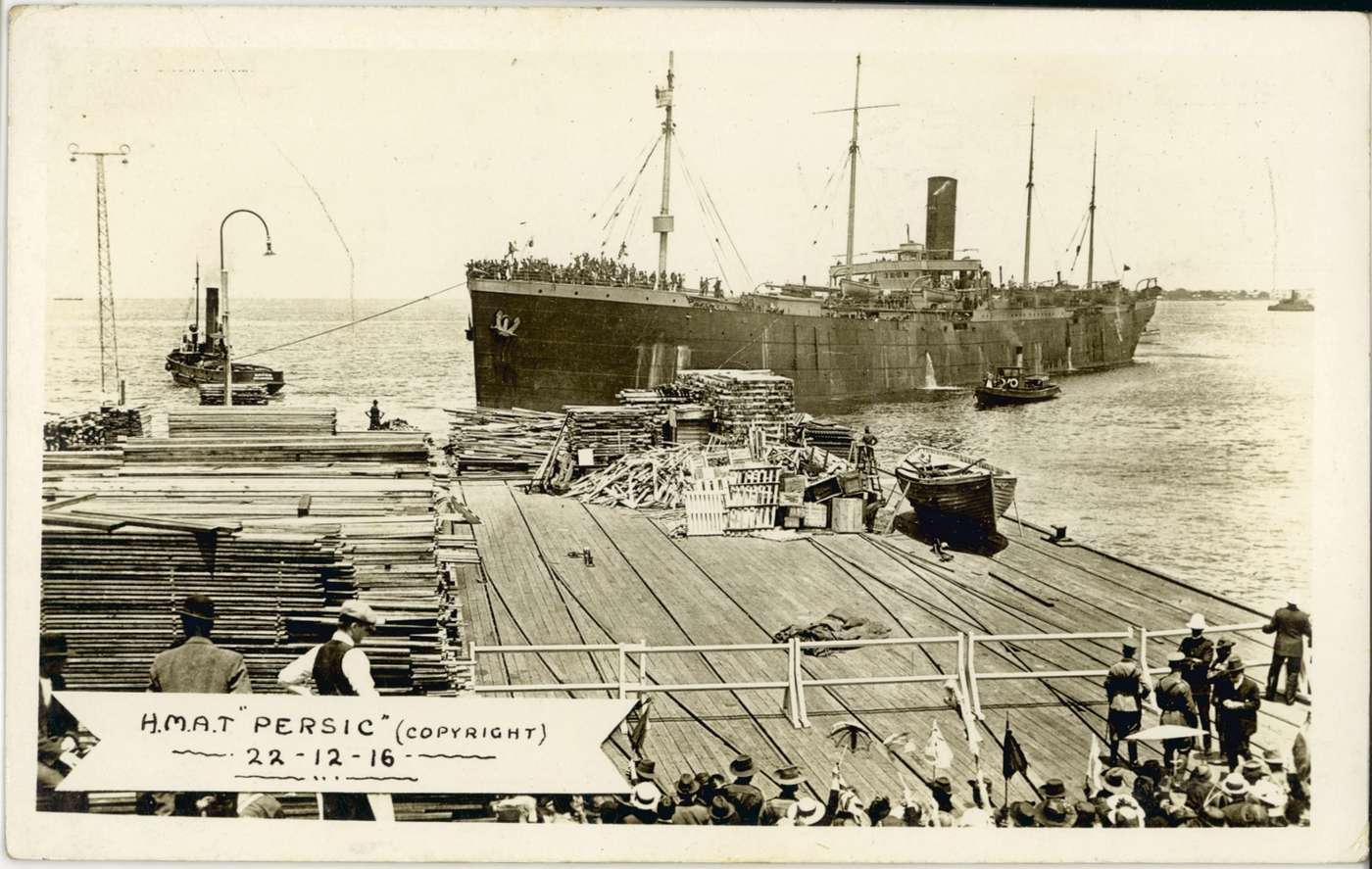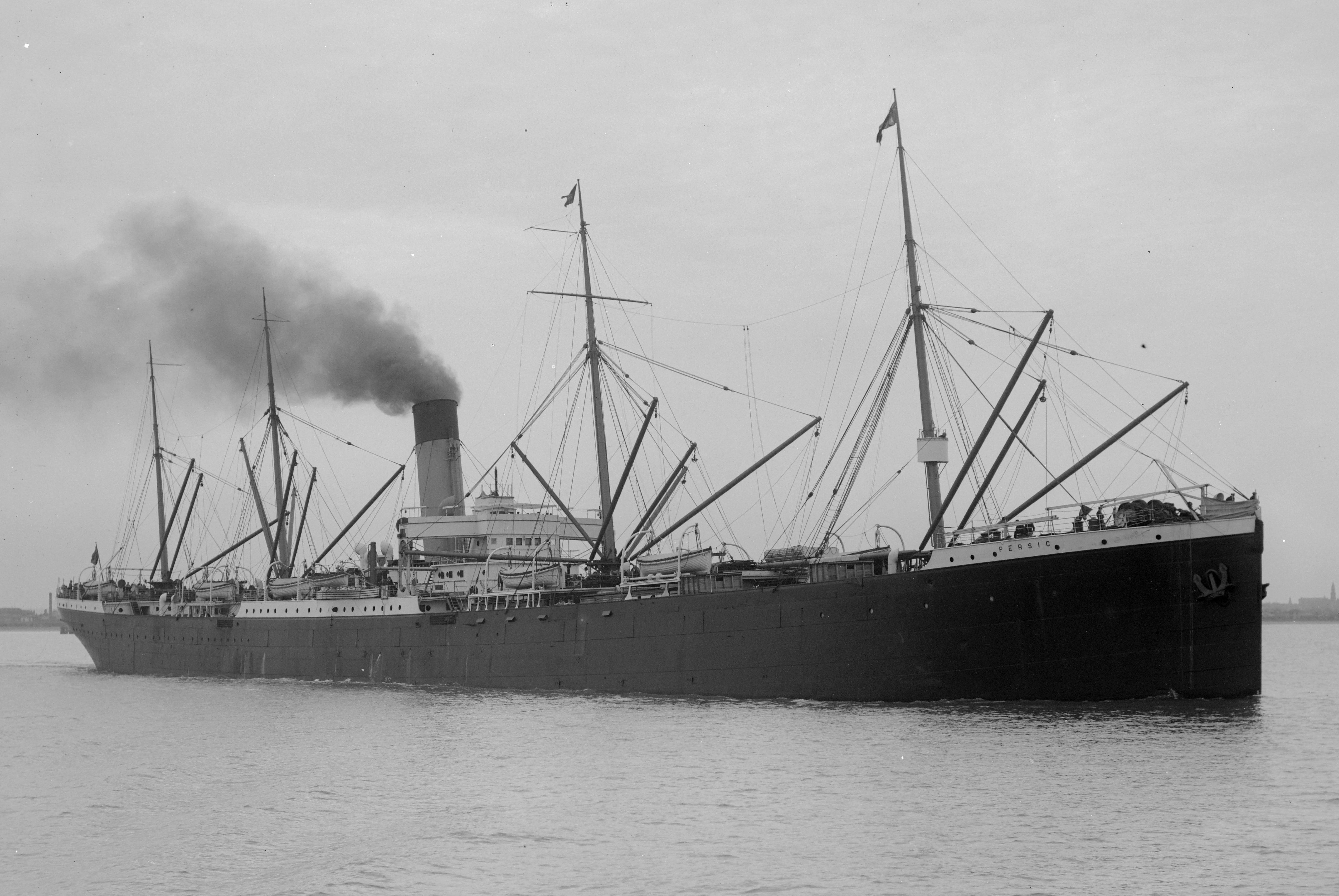SS Persic on:
[Wikipedia]
[Google]
[Amazon]
SS ''Persic'' was an
 During 1901, the ''Persic'' made at least three return journeys between England and Australia. In February 1901 the vessel transported 'one of Australia's greatest and most loved poets' and bush balladeers,
During 1901, the ''Persic'' made at least three return journeys between England and Australia. In February 1901 the vessel transported 'one of Australia's greatest and most loved poets' and bush balladeers,
 The vessel was taken up by the Australian government as a war transport on the outbreak of
The vessel was taken up by the Australian government as a war transport on the outbreak of
 In 1926 she went for another refit at Harland and Wolff's
In 1926 she went for another refit at Harland and Wolff's
ocean liner
An ocean liner is a passenger ship primarily used as a form of transportation across seas or oceans. Ocean liners may also carry cargo or mail, and may sometimes be used for other purposes (such as for pleasure cruises or as hospital ships).
C ...
of the White Star Line
The White Star Line was a British shipping company. Founded out of the remains of a defunct packet company, it gradually rose up to become one of the most prominent shipping lines in the world, providing passenger and cargo services between ...
, built by Harland and Wolff
Harland & Wolff is a British shipbuilding company based in Belfast, Northern Ireland. It specialises in ship repair, shipbuilding and offshore construction. Harland & Wolff is famous for having built the majority of the ocean liners for the ...
in 1899. She was one of the five ships (the others being the , , and ) built specifically to service the Liverpool
Liverpool is a City status in the United Kingdom, city and metropolitan borough in Merseyside, England. With a population of in 2019, it is the List of English districts by population, 10th largest English district by population and its E ...
–Cape Town
Cape Town ( af, Kaapstad; , xh, iKapa) is one of South Africa's three capital cities, serving as the seat of the Parliament of South Africa. It is the legislative capital of the country, the oldest city in the country, and the second larges ...
– Sydney route. The voyage took six weeks.
''Persic'' was the third Jubilee-class ship to be built for the Australia service, and was launched at Belfast
Belfast ( , ; from ga, Béal Feirste , meaning 'mouth of the sand-bank ford') is the capital and largest city of Northern Ireland, standing on the banks of the River Lagan on the east coast. It is the 12th-largest city in the United Kingd ...
on 7 September 1899, entering service on 7 December that year. ''Persic'', like her sisters was a single- funnel liner, which had capacity for 320 third class passengers, and also had substantial cargo capacity with seven cargo holds
A hold (abbreviated HLD, H or HD) is awarded to a relief pitcher who meets the following three conditions:
:1. Enters the game in a save (baseball), save situation; that is, when all of the following three conditions apply:
:: (a) He appears i ...
, most of them refrigerated for the transport of Australian meat.
Early career
''Persic'' set out on her maiden voyage on 7 December 1899, as theBoer War
The Second Boer War ( af, Tweede Vryheidsoorlog, , 11 October 189931 May 1902), also known as the Boer War, the Anglo–Boer War, or the South African War, was a conflict fought between the British Empire and the two Boer Republics (the Sout ...
was underway by this time, she carried 500 troops for South Africa. The maiden voyage turned out to be a fiasco as the ship developed a major fault: cracks developed on her rudder
A rudder is a primary control surface used to steer a ship, boat, submarine, hovercraft, aircraft, or other vehicle that moves through a fluid medium (generally air or water). On an aircraft the rudder is used primarily to counter adverse yaw a ...
stock casting, which resulted in it breaking by the time she reached Cape Town
Cape Town ( af, Kaapstad; , xh, iKapa) is one of South Africa's three capital cities, serving as the seat of the Parliament of South Africa. It is the legislative capital of the country, the oldest city in the country, and the second larges ...
. ''Persic'' had to remain at Cape Town until a replacement could be shipped out from Belfast
Belfast ( , ; from ga, Béal Feirste , meaning 'mouth of the sand-bank ford') is the capital and largest city of Northern Ireland, standing on the banks of the River Lagan on the east coast. It is the 12th-largest city in the United Kingd ...
and fitted. When the voyage resumed early the next year, ''Persic'' repatriated injured and sick Australian troops.
On 26 October 1900 the England-bound ''Persic'' travelling along the equator assisted the crew of the Glasgow
Glasgow ( ; sco, Glesca or ; gd, Glaschu ) is the most populous city in Scotland and the fourth-most populous city in the United Kingdom, as well as being the 27th largest city by population in Europe. In 2020, it had an estimated pop ...
steamer ''Maudra'', which had caught on fire. Although extinguished the day before, it was found to be more serious, and the ''Maudra'' was abandoned. Part of the September–November journey, Australian artists Hugh Ramsay and George Washington Lambert
George Washington Thomas Lambert (13 September 1873 – 29 May 1930) was an Australian artist, known principally for portrait painting and as a war artist during the First World War.
Early life
Lambert was born in St Petersburg, Russia, t ...
travelled on the ''Persic'' from Sydney to London. Lambert became successful in London; Ramsay preferred Paris but had to return to Australia when his health failed.
 During 1901, the ''Persic'' made at least three return journeys between England and Australia. In February 1901 the vessel transported 'one of Australia's greatest and most loved poets' and bush balladeers,
During 1901, the ''Persic'' made at least three return journeys between England and Australia. In February 1901 the vessel transported 'one of Australia's greatest and most loved poets' and bush balladeers, Will H. Ogilvie
Will H. Ogilvie (21 August 1869 – 30 January 1963) was a Scottish-Australian narrative poet and horseman, jackaroo, and drover, and described as a quiet-spoken handsome Scot of medium height, with a fair moustache and red complexion. He ...
from Sydney, where he returned to Scotland. Artist G. W. Lambert who travelled the year before on the ''Persic'' also served as an illustrator in Ogilvie's 1898 work ''Fair girls and gray horses''.
In July 1901 described as a large steamer, the ''Persic'' went from Liverpool
Liverpool is a City status in the United Kingdom, city and metropolitan borough in Merseyside, England. With a population of in 2019, it is the List of English districts by population, 10th largest English district by population and its E ...
, to Cape Town, via Adelaide
Adelaide ( ) is the list of Australian capital cities, capital city of South Australia, the state's largest city and the list of cities in Australia by population, fifth-most populous city in Australia. "Adelaide" may refer to either Greater A ...
and Melbourne
Melbourne ( ; Boonwurrung/ Woiwurrung: ''Narrm'' or ''Naarm'') is the capital and most populous city of the Australian state of Victoria, and the second-most populous city in both Australia and Oceania. Its name generally refers to a me ...
to reach Sydney. The return journey saw her loaded with 1,200 tons of wheat (bound for England) as large general cargo.
Her November 1901 journey from Liverpool via Cape Town saw a passenger manifest of 335 passengers being 15 bound for Adelaide, 113 for Melbourne, and 207 for Sydney. On board were invalided and time-expired Australian and New Zealand soldiers from the Boer War. Additional to over two-hundred passengers on her return journey leaving Australia for England also saw her well-laden with cargo:
:She carries a very large and varied cargo, comprising amongst other lines 10,200 bales wool, 300 tons cocoanut oil, 160 casks tallow, 1467 Ingots tin, 140 tons chrome ore, 120 bales sheepskins, 30 bales furskins, 16,130 carcases mutton and lamb, and 1200 boxes butter.
The ''Persic'' continued her return trips services through the 1900s and 1910s. Mid-1910 saw the ship fitted with wireless telegraphy
Wireless telegraphy or radiotelegraphy is transmission of text messages by radio waves, analogous to electrical telegraphy using cables. Before about 1910, the term ''wireless telegraphy'' was also used for other experimental technologies for ...
.
World War I service
 The vessel was taken up by the Australian government as a war transport on the outbreak of
The vessel was taken up by the Australian government as a war transport on the outbreak of World War I
World War I (28 July 1914 11 November 1918), often abbreviated as WWI, was List of wars and anthropogenic disasters by death toll, one of the deadliest global conflicts in history. Belligerents included much of Europe, the Russian Empire, ...
in 1914, becoming known by the designation HMAT (Hired Military Australian Transport) A34, until 9 November 1917, when ''Persic'' was commandeered under the British government's Liner Requisition Scheme. In mid-1918 sailing from Canada as part of an escort going to England, zig-zagging whilst trying to avoid a torpedo, the ''Persic'' ran into her sister ship the ''Runic'' with no serious damage.
On 12 September 1918, ''Persic'' was sailing in a convoy carrying 2,800 American troops when she was torpedoed by the German U-boat
U-boats were naval submarines operated by Germany, particularly in the First and Second World Wars. Although at times they were efficient fleet weapons against enemy naval warships, they were most effectively used in an economic warfare ro ...
near the Isles of Scilly. Despite substantial damage she stayed afloat, and limped back to port under her own power where she was beached, and all on board survived.
Final years
In July 1919, ''Persic'' was returned to commercial service, and the following year underwent a refit to overhaul and modernise her accommodation, which was changed to carry 260 passengers in Second class. She continued to ship Australian cargo, including landing in Hobart, Tasmania for 47 000 cases of fruit for London. In 1926 she went for another refit at Harland and Wolff's
In 1926 she went for another refit at Harland and Wolff's Govan
Govan ( ; Cumbric?: ''Gwovan'?''; Scots: ''Gouan''; Scottish Gaelic: ''Baile a' Ghobhainn'') is a district, parish, and former burgh now part of south-west City of Glasgow, Scotland. It is situated west of Glasgow city centre, on the south b ...
yard, where her engines were found to suffering from advanced wear and tear with limited service life; as replacing them would not have been financially justifiable due to the ship's age, the decision was made to withdraw her from service. In September 1926 she made one last voyage to Australia, and upon her return she was laid up on the River Mersey
The River Mersey () is in North West England. Its name derives from Old English and means "boundary river", possibly referring to its having been a border between the ancient kingdoms of Mercia and Northumbria. For centuries it has formed par ...
. In June 1927 she was sold for scrap for £25,000 to the Dutch shipbreakers Hendrik Ido Ambacht, and on 7 July she left Liverpool for the Netherlands to be scrapped after 27 years of service.
References
{{DEFAULTSORT:Persic 1899 ships Ships built in Belfast Ships of the White Star Line Ships built by Harland and Wolff